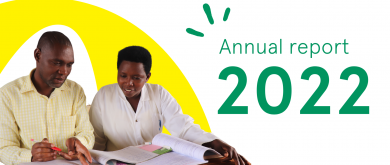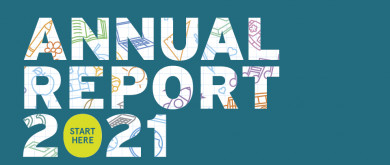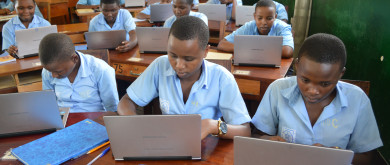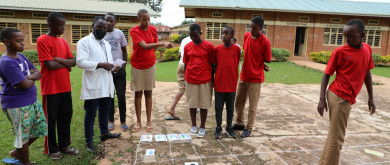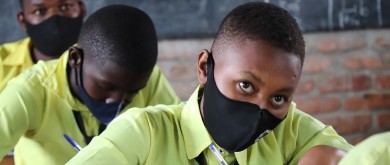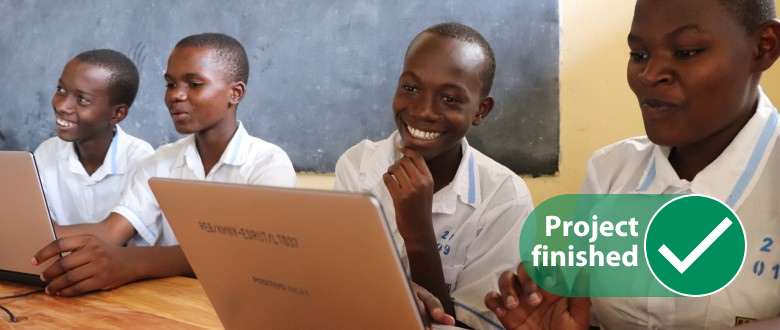
Aspiring to become a high-income country by 2050 (Vision 2050), Rwanda aims to shift from an economy heavily dependent on agriculture towards a digital economy. The digital sector is expected to grow strongly in the coming years. ICT can be used as a tool for self-employment too. However, digital literacy remains low in Rwanda. Adolescents also lack the problem-solving and creative skills crucial to boosting innovation. Moreover, there is still a gender gap in learning outcomes for STEM and relatively few girls choose to pursue higher education in STEM fields.
To unlock youth’s potential in this new economy, Rwanda introduced a new competence-based curriculum, spearheading ICT and 21st century skills, such as creativity and problem-solving skills. To develop these skills, the Rwanda Education Board (REB) integrated Scratch in the upper primary school curriculum of Science and Elementary Technology (SET) and in the lower secondary school curriculum of ICT. Scratch is a free tool that youngsters can use to create stories, games and animations based on coding principles. More recently, the Ministry of ICT and Innovation announced plans to further integrate coding in the secondary school curriculum and to encourage schools to form coding clubs to promote coding skills.
Yet, many teachers lack the required competences and skills to teach coding. Nor do they have digital learning materials or technical and pedagogical support available. Hence, most teachers are reluctant to effectively integrate Scratch in their lessons.
Secondary school teachers of STEM and ICT have the competences to integrate Scratch into ICT and STEM lesson plans and to initiate and facilitate after school coding clubs.
- Ministry of Education (MINEDUC)
- Rwanda Education Board (REB)
- Rwanda Coding Academy (RCA)
In the framework of Scratc²h 2050, learners were introduced to coding principles in the classroom as STEM and ICT teachers integrated Scratch in STEM and ICT courses. The coding clubs provided the opportunity to truly develop digital skills in an enjoyable environment, combining fun with learning the language of generation Z: the programming language.
To this end, VVOB trained secondary school STEM and ICT teachers on coding and its benefits through blended learning. After training, they continued to develop professionally through participation in ongoing online and biannual face-to-face ScratchEd Meetups.
The project was built around four pillars:
- Development of a Scratc²h 2050 pedagogical guide, complemented by ICT and STEM lesson plans and Open Education Resources (OERs)
- CPD trajectory for ICT and STEM teachers
- Professional learning communities of ICT and STEM teachers
- Establishment of after-school Scratc²h 2050 coding clubs
The achievements of the Scratc²h initiative in Kanyonza district:
- RCA staff have offered quality training to STEM and ICT teachers.
- 164 Secondary school STEM and ICT teachers from 54 secondary schools in Kayonza district have:
- undertaken a CPD trajectory on digital literacy and coding skills, developing their competences to initiate and facilitate Scratch coding clubs and integrate Scratch in their courses.
- participated in professional learning communities.
- facilitated after-school coding clubs.
- 247 after-school coding clubs have been established, reaching 3724 learners of which 50% are girls.
- A Scratc²h 2050 resource library was developed containing materials for secondary school teachers and learners in Rwanda.
To reach its goals, VVOB develops the capacity of its partners in Rwanda. VVOB uses capacity development trajectories that give partners maximal responsibility in the execution and management of their own change processes. This is done through technical assistance provided by the VVOB team in Rwanda, which includes both local and international educational and change management experts.
Scaling opportunities
Evidence suggests that teacher and learner motivation, school leader support, and general district support will drive the sustainability of Scratch coding clubs and other outcomes from the Scratc²h 2050 project. Additional support, such as offering more teacher training with a continuous professional development model, and engagement with other Scratch initiatives, such as the hackathon and exposure events, would also be helpful for sustaining project outcomes and impacts. (Source: endline study)





